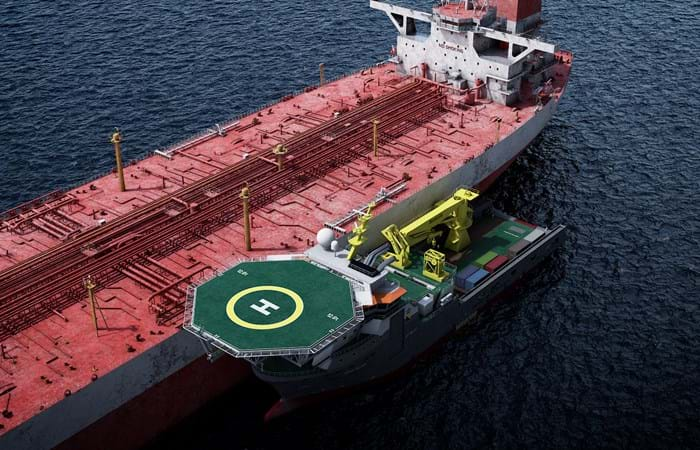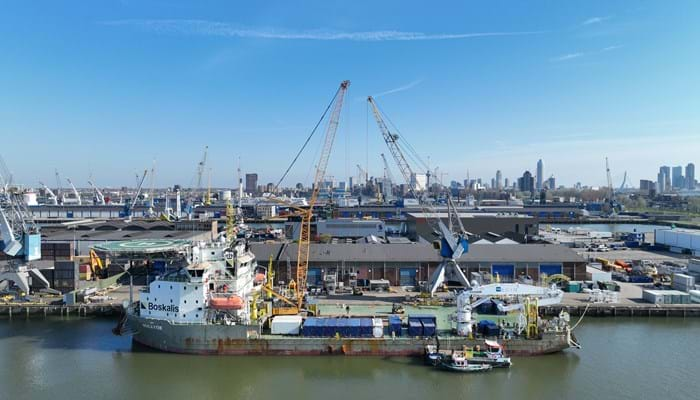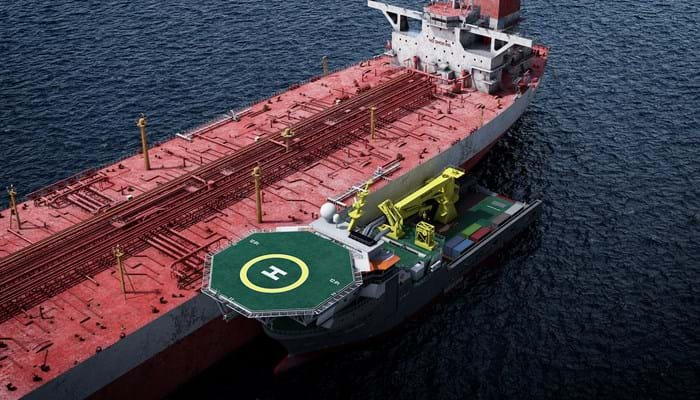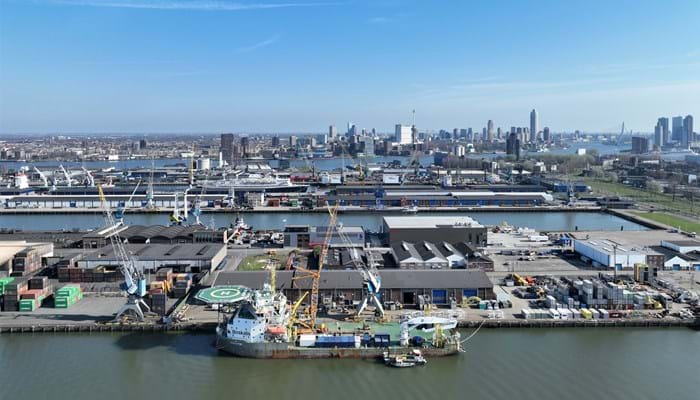The Safer is a Floating Storage and Offloading (FSO) facility moored approximately 9 kilometers off the Red Sea coast of Yemen and 50 kilometres northeast of the port of Hodeida. Constructed in 1976 as an oil tanker and converted in 1987 to be a floating storage facility, the Safer is single-hulled and is believed to contain an estimated 1.14 million barrels of light crude oil. The FSO has not been maintained since 2015 because of the conflict in Yemen, and it has decayed to the point where there is a risk it could explode or break apart, which would have disastrous environmental and humanitarian effects on the region. Boskalis through its subsidiary SMIT Salvage has been tasked with the removal of the oil from the FSO Safer.
Project Progress Log
We are providing periodic updates of the operation through this blog. Any significant events will also be posted on social media and if you want to stay up to date, we recommend that you follow Boskalis on LinkedIn and/or Twitter (www.linkedin.com/company/boskalis/) or (twitter.com/beleefboskalis).
Tuesday 29 August 2023 - Salvage operation in Yemen concluded
After having transferred all the 1.1 million barrels of oil from the decaying FSO Safer to the replacement oil tanker Yemen (formerly known as Nautica) on 11 August, our colleagues of SMIT Salvage completed the final activities yesterday, which included the cleaning of the tanks of the Safer and assisting with the mooring of the Yemen at a location in the vicinity of the Safer.
Our multipurpose support vessel Ndeavor is currently on its way to Djibouti where the salvage crew will disembark. Thereafter, the Ndeavor will set sail for Rotterdam.
The departure from Yemen marks the end of a complex salvage operation that began in late May. With the successful oil transfer a huge environmental disaster with serious humanitarian, environmental and economic consequences was averted.
Friday 11 August - All oil transferred from the FSO Safer to the replacement tanker
All oil has been removed from the decaying FSO Safer by our colleagues of SMIT Salvage. During this operation over 1.1 million barrels of oil was successfully transferred to the replacement oil tanker Yemen (formerly known as Nautica) moored alongside the FSO Safer. The successful completion of this complex operation prevented a huge environmental disaster with serious humanitarian, environmental and economic consequences.
The remaining activities of SMIT Salvage include the cleaning of the tanks, which is expected to take approximately one week. The FSO Safer will be prepared for transport to a green scrapping yard under the responsibility of the UN.
Read more in our press release
Video and photos of the ship-to-ship oil transfer from the FSO Safer to the replacement oil tanker Yemen.
Friday 28 July - Ship-to-ship oil transfer from FSO Safer to replacement oil tanker is progressing well
Earlier this week, we announced the start of the ship-to-ship transfer of the oil from the FSO Safer to the replacement oil tanker Yemen (formerly known as Nautica); an important milestone in this United Nations-coordinated operation to avert a potential massive environmental and humanitarian disaster off the coast of Yemen. The oil transfer is progressing well and will take two to three weeks.
To pump the oil to the Yemen hydraulic pumps are lowered into each tank of the FSO Safer. During this transfer operation inert gas is supplied to keep the tank atmosphere at safe levels during the operation. Once all the pumpable oil has been removed from the Safer, a layer of thick oil will remain on the bottom of the tanks. This layer will be removed by a mobile spray tank cleaning machine, which will clean the inside of the tanks in an operation that is expected to take two to three weeks.
Video of the mooring of the replacement oil tanker Yemen and the start of the ship-to-ship oil transfer.
Tuesday 25 July – Start of oil transfer from the FSO Safer to the replacement oil tanker
Following the successful mooring of the very large crude carrier Yemen (formerly known as Nautica) alongside the FSO Safer off Yemen’s Red Sea coast, our SMIT Salvage colleagues were able to take the final precautions, connect the hoses between the two tankers and start the ship-to-ship transfer of the approximate 1.14 million barrels of crude oil from the decaying FSO Safer into the replacement oil tanker Yemen. Pumping commenced on Tuesday 25 July at 10.45 local time.
Once the Yemen arrived on site last week, the vessel was moored alongside the Safer’s starboard side over the weekend. During this successful mooring operation, the Yemen was assisted by the Smit Lamnalco tugs SL Aden and SL Manakin; Boskalis’ multipurpose support vessel Ndeavor remained alongside the Safer on its port side to keep the heading of the FSO Safer in position during the mooring operation. Subsequently oil booms were installed on the bow and stern between both vessels as a precautionary measure during the cargo transfer.
The start of the ship-to-ship transfer of the oil, which is expected to take around two to three weeks, marks an important milestone in this United Nations-coordinated operation to avert a potential massive environmental and humanitarian disaster.
Photos of the start of the ship-to-ship oil transfer. More photos and video footage will soon be available on this page.
27 June – Inspections and oil transfer preparations almost completed
Over the past two weeks, further good progress has been made by the colleagues of SMIT Salvage to prepare the FSO Safer for the oil transfer phase of the operation. Recent work has focused on inspecting and reinstating equipment on board the FSO Safer. This includes various winches required for the mooring operation as well as the stripping pumps to facilitate the transfer of last remains of the cargo to the replacement oil tanker alongside the Safer. Furthermore, the underwater inspection of the hull by a team of professional divers has been executed.
Two tugboats owned by Smit Lamnalco also arrived on site. These tugboats will assist with the berthing of the replacement tanker when she arrives on site. For contingency purposes oil booms will be installed as a precautionary measure during the ship-to-ship transfer of the oil.
Video of the SMIT Salvage crew inspecting FSO Safer and executing preparatory work.
Friday 9 June – Ndeavor berths alongside Safer and inspections and preparations continue
Boskalis’ multipurpose vessel Ndeavor recently berthed alongside the FSO Safer, after which the colleagues of SMIT Salvage continued with the inspections of the deck machinery and the structural integrity of the hull. Furthermore, inert gas generators were transferred from the Ndeavor onto the Safer. The level of oxygen and other flammable gases in each of the oil tank compartments must be reduced by pumping inert gas into the compartments before the tanks can be declared safe for the ship-to-ship transfer of the oil. As part of the preparations, the inspection of the manifold on board the FSO has also commenced. In parallel to these activities, a mobile fixed staircase was built to facilitate easy and safe access between the Ndeavor and the Safer. Overall, the first phase of the operation including these inspections and preparing the Safer for the ship-to-ship transfer of the oil are progressing well.
Video and photos of the SMIT Salvage crew inspecting FSO Safer and executing preparatory work.
Friday 2 June – Salvage crew boards the FSO Safer and completes first inspections
After Boskalis’ multipurpose vessel Ndeavor reached its destination offshore Yemen earlier this week, the colleagues of SMIT Salvage were able to board the FSO Safer on Wednesday afternoon. First, gas measurements were taken to assess the presence of toxic gas in- and around the vessel. After the ship was declared “safe to access”, a number of operational steps were initiated. This included loading of mobile inert gas generators and conducting inspections of the FSO and its deck machinery as well as structural hull assessments. It is expected that the Ndeavor will soon be able to berth alongside the Safer after which further preparations will continue.
Video of the SMIT Salvage crew boarding FSO Safer and completing first inspections.
Tuesday 30 May - Boskalis’ multipurpose support vessel Ndeavor reaches location of the FSO Safer
Today at 11:00 CET, Boskalis’ multipurpose support vessel Ndeavor reached the location of the FSO Safer in Yemen. After berthing the vessel alongside the Safer the next phase of the salvage operation will commence, which consists of taking the following precautionary measures by the salvage team:
- Skilled experts will take different gas measurements to assess the presence and levels of gasses inside the vessel prior to declaring it “safe to access” for planned salvage activities
- Further (visual) inspections whilst wearing specialized protective gear will be conducted on board the FSO Safer, including the pump and engine rooms as part of the overall condition assessment.
- Loading of mobile inert gas generators to fill the cargo tanks with inert gas and create a safe tank environment.
- The condition of the cargo will be assessed to finetune the transfer operation.
- The cargo and inert gas lines, valves and manifolds will be inspected and subject to the outcome, the salvage plan can be refined.
- An inspection of the state of the mooring arrangements.
- Underwater inspections will be executed where necessary.
Photos and video of the Ndeavor reaching the location of the FSO Safer.
Monday 29 May - Boskalis vessel Ndeavor leaves Djibouti and sets sail for FSO Safer in Yemen
Today at 05:15 CET, Boskalis’ multipurpose support vessel Ndeavor left Djibouti and set sail for Yemen where it will be deployed for the FSO Safer oil transfer operation. In Djibouti, the salvage team boarded the vessel and final preparations were made. The sailing time to Yemen is approximately 48 hours. Upon arrival at the FSO Safer, the next phase of the salvage operation will commence. Further updates to follow. More information: Boskalis.com/safer






